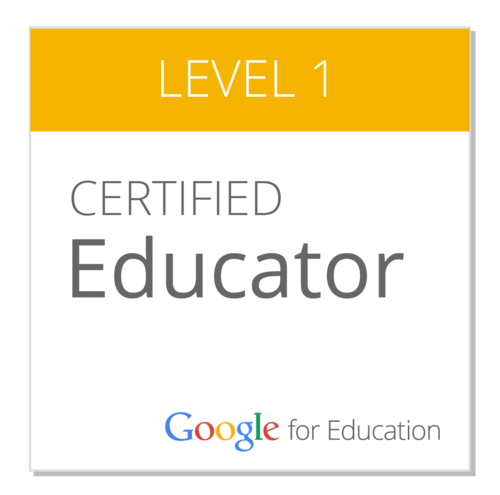How to Become a Google Certified Educator
The Google Certified Educator program offers the chance for teachers to gain practical pd while earning a badge to demonstrate their edtech expertise

What is a Google Certified Educator?
A Google Certified Educator is someone who has demonstrated that they have a level of mastery using a wide variety of Google edtech tools in teaching and learning environments.
Which Edtech Tools Do Google Certified Educators Need to Be Well Versed In?
Google Certified Educators can leverage a multitude of Google edtech applications including Google Classroom, Docs, Forms, Meet, Sheets, Sites, and Slides to enhance teaching and learning.
Why Should I Become a Google Certified Educator?
Elevate Edtech Integration in Your Class: Becoming a Google Certified Educator provides a pathway to edtech integration in ways that elevate how to maximize use of Google platforms. Through certification, you will be exposed to the many layers of applicability that each Google tool has, and develop the fluency to use it to introduce content to students, engage them in the learning process, and allow them to demonstrate their learning.
Advance Your Own Knowledge: Beyond having the capability to use the functions of Google edtech tools, becoming a Certified Google Educator will provide you with advanced knowledge and skills focused on digital fluency, literacy, and citizenship that can then be passed on to your students.
Build Credibility as an Edtech Expert: Lead by Learning! Becoming a Certified Google Educator will build your expertise and credibility as a knowledgeable edtech integrator and leader in your school and beyond. The Certified Google Educator badge that you earn is globally recognized and can be added to your resume, portfolio, or website. Also, with technology being so ubiquitous, becoming a Certified Google Educator could be helpful for future job interviews and career moves.
How Do I Prepare for the Google Certified Educator Exam?
Google for Education provides a robust training center with fundamental and advanced training options that are offered at no cost to test taskers.
The current training topics at the fundamental and advanced levels are:
Tools and ideas to transform education. Sign up below.
- Get Ready to Use Technology in the Classroom
- Expand Your Access to Help and Learning
- Have a (Mostly) Paperless Classroom
- Save Time Communicating
- Organization Activities for Yourself and Others
- Bring Meetings Online
- Bring Student Work Online
- Measure, Understand, and Share Student Growth
- Teach Students Online Skills
- Build Interactive Lessons
- Captivate Your Class with Video
- Facilitate Group Work
- Promote Digital Citizenship and Positive Online Behavior
- Promote and Model the Effective Use of Digital Tools
- Leverage Learning Models to Personalize Learning
- Use Advanced Features to Optimize Workflow
- Connect with Guardians
- Analyze and Interpret Student Data
- Organize Your Class and School Materials More Effectively
- Design Interactive Curricula
- Teach Beyond the Four Walls of Your Classroom
- Harness the Power of Google for Research
- Give Students a Voice
- Student Agency
Note: All of the training titles above are from the Google for Education Site, under the Teacher Center, Training Courses Tab
What is the Process of Earning Google Educator Certification?
Google for Education provides a simple process to earn certification, starting with working toward Level 1 Google Educator certification.
After creating an account on the Google for Education site, you simply select the exam, pay for it, and then the exam credentials are sent to your Gmail account. Once you are ready, you start the exam, which you will have 180 minutes to complete. Questions are both content and hands-on, going through the different Google applications.
The exam cost is $10 and is valid for 3 years, after which you need to take the exam again to re-certify. By then, it will likely include new items that were not previously available previously, so as technology continues to advance, so will the need for you to build your knowledge.
The Google for Education site also offers answers to frequently asked questions.
What Should I Do After Earning Level 1 Certification?
Earning Google Level 1 Google Certification is just the beginning! As you integrate many of the Google edtech applications and interactive experiences into your classes, you can also continue to build your own fluency and expertise.
Your future path may include learning advanced Google edtech skills and going for Level 2 certification. Other innovative edtech leadership opportunities with Google for Education include becoming a Certified Trainer, Certified Coach, or Certified Innovator.
No matter what level of certification you seek, you will develop the knowledge, awareness, and skills needed to provide students with transformative learning.
Dr. Stephanie Smith Budhai is faculty member in the College of Education and Human Development at the University of Delaware, focusing on Educational Technology, Learning Design, and Justice-centered Pedagogies. She holds two national education technology leadership positions on the Information Technology Council and as Chair of the Culture and Climate Committee for the Society for Information Technology and Teacher Education (SITE). She holds a Ph.D. in Learning Technologies, and a M.S. in Information with a specialization in Library and Information Science, and K-12 teaching certifications in Technology Education, Instructional Technology and Business, Computers, Information Technology, Special Education and Elementary Education. Dr. Smith Budhai is the 2021 SITE Emerging Leader and the 2017 ISTE Awardee for Excellence in Teacher Education. She is also a Nearpod, and VoiceThread Certified Educator. Dr. Smith Budhai has more than a decade of online teaching experience, and has published myriad books (two have been translated into Arabic), articles, and invited editorials surrounding the use of technology and online learning in education. A few of her book publications include:
- Critical AI in K-12 Classrooms: A Practical Guide for Cultivating Justice and Joy
- Best Practices in Engaging Online Learners through Active and Experiential Learning Strategies
- Leveraging Digital Tools to Assess Student Learning
- Nurturing Young Innovators: Cultivating Creativity in the Classroom, Home and Community
- Increasing Engagement in Online Learning: Quick Reference Guide
